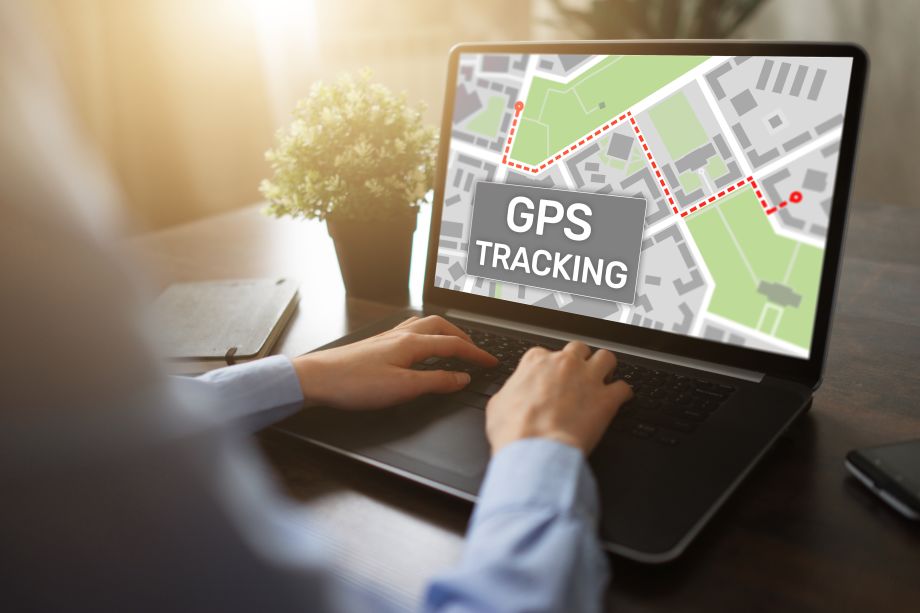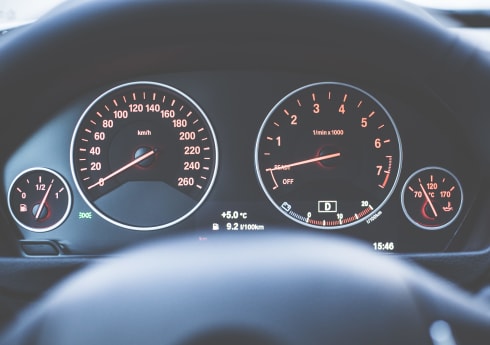Telematics tracker guide for businesses
Telematics systems let your business work smart. You get real-time data into your fleet, plus you can save money and get from A-B much faster.
A cost-effective telematics tracker is a vital piece of kit in all of this. With one, you always know where a vehicle is. So, here’s our guide to how they work! Plus, at any time you can compare the market to get the right deal for your business.

What’s a telematics tracker?
A telematics tracking device is a GPS (global positioning system) device that transmits data. It covers driver and vehicle info like:
- Speed
- Location
- Time
- Driver info
- Vehicle identification
The contraption collects GPS fleet tracking data and fires that across to a server. That gathers all the data, so you can look over that at your leisure.
So, yes, it’s very useful for making your fleet more efficient, but it also helps you with things like theft.
If someone steals one of your vehicles, you’re going to know exactly where your vehicle is. That increases the chances of recovering it by a lot.
The types of data telematics trackers track
Lots of businesses these days need one or more vehicles. Sometimes even a whole fleet.
But having all that running around across the UK without any data about what’s going on… isn’t the best idea. In fact, it puts your business in a really difficult position.
What do you need? Telematics trackers! That way you’re always in the know about what’s going on with your vehicles.
So, what does tracking telematics keep track of, exactly? Well, the following:
- Vehicle speed
- MPG
- The amount of fuel used
- A driver’s driving style
- If a driver leaves an ignition on
- Whether doors are left open
- Weight of a payload
- Gear usage
- The braking intensity
- If a panic alarm is activated
- If there’s been an accident
- If there’s been a break-in
All of the above are legal, by the way, if you were wondering. It’s absolutely fine to monitor your drivers in action. You just need to tell them about the tracking devices on their car before they hit the road.
In truth, it’s good news for them.
With these devices installed, they’ll learn new skills, get better at their job and improve their career standing.
From your side, you get ever-improving drivers, more efficient fleet procedures and lots of money saving tactics. Not bad from as little as £2.50 a month, eh?
How to get set up with a telematics tracking device
Once you’ve picked your provider, you’ll need to get all the features installed. It’s a mixture of computer software and devices to add to the vehicle.
But that depends on what type of provider you choose. However, it often goes like this:
- Tracking devices: Once installed on a vehicle, you can see exactly where it is at all thanks. That’s down to GPS. To get one installed, you may need to briefly take your vehicle out of service. But it doesn’t take long to install a device.
- Software: You may need to install desktop software or access it online. The systems let you track, report and message across an online portal. Plus, you’ll usually get an app to access the data from your phone.
- Reports: You’ll be getting a lot of data from your system! From that you can make reports on things like:
- Driver performance
- Fuel efficiency
- Idling time
- Driver alerts: Instant alerts in real-time will also likely be included. These will come straight to your computer or phone and will be triggered by things like bad driving, accidents or a break-in.
- Vehicle alerts: Maintenance alerts for your vehicle will usually be included. Things like if a van is overheating or needs immediate maintenance—you can respond to that as you need to.
As you can see, then, based on everything you get full control of your fleet. And you can make it more productive with all the insights you get from the fancy tech.
Picking a real-time or passive system
Okay, so your business can choose between a real-time (active) tracker system, or one that’s passive. What does any of that mean? Here’s an explainer:
- Real-time systems: You’ll get a real-time tracking system where you can keep an eye on your fleet with updates made constantly throughout the day. For example, exactly where your drivers are so you can follow them step-by-step on a digital map.
- Passive systems: You get updates on your fleet, but only every now and then. For instance, a map will update occasionally with details about where your drivers are.
Which one is best for your business? Well, let’s break that down for you.
Real-time vehicle tracking
From your fleet management software you’ll get instant updates. These come directly from either cellular data networks or satellite ones.
The advantages of picking this are:
- Real-time data updates (obviously)! So, you can make important decisions and see where everyone is at all times.
- You can configure the system to assign tasks to vehicles based on costs, driver hours, fuel efficiency and their location
- These systems send real-time updates to your customers
However, the downsides are:
- Real-time systems are more expensive than passive ones
- Ongoing costs are higher, too
There’s also a possibility your drivers might not like the idea of being tracked all day, everyday. So, this is probably the better solution for big businesses with huge fleets to keep track of.
Whereas if you’ve only got a few vehicles keep an eye out for, then you’re probably much better off with a passive system.
Passive vehicle tracking
If you’re looking to cut down costs, then this is a great choice. It’s ideally suited for small businesses.
This is because passive systems are quite basic, you just get a bare bones set of features that let you know where your fleet is. Some advantages of that are:
- The lower cost
- Lower ongoing costs, to boot!
- Happy drivers who won’t mind more basic tracking
Some of the downsides you should keep in mind are:
- You can’t adjust vehicles that have gone off-route
- Customers can’t be updated about delivery times
- Data uploads aren’t always easy
- It’s not future-proofing your business
Plenty to mull over, then. But remember you can always just compare the market to find the best deal for your business. It only takes a couple of minutes to find out!
What’s a telematics box theft tracker?
A big part of the brilliance of telematics trackers is the anti-theft devices.
It’s basically black box insurance, which means your vehicle gets fitted with a device that has:
- Anti-theft alerts
- Theft recovery features
Say your driver has parked their van up for lunch and is in a motorway service station. Then some hooligan fancies taking off with the fancy van and company laptop inside left on the passenger seat.
If they smash the window and climb in, there’ll be an instant theft alert for that.
Plus, the telematics tracker will let you know exactly where the thief takes the vehicles. And that makes recovering the car infinitely easier.
With a telematics box and theft tracker fitted, you’re pretty much guaranteed peace of mind over your whole fleet.
The business benefits of a telematics tracker
With a telematics tracking device, your business is all set for crime busting and money saving antics. Here are the main benefits to getting these devices.
Control crime
Unfortunately, when you’re a fleet manager you’re going to face theft. It’s going to happen sooner or later.
But if you’ve not got any vehicle trackers, the chance of recovering the thing is pretty much nil.
But if you’re got a telematics tracker, then statistics show you’ll get the vehicle back 95% of the time. And why? Because you know exactly where it is! Simple as that.
All you have to do is get in contact with the police and track down your vehicle. Now, doesn’t that give you peace of mind? It’s an early birthday present for all busy fleet managers.
Get more productive
With the data you get from your systems, you can do all sorts of things to improve your fleet management.
Example time—with all the route data you get, you can schedule your driver journeys to take routes that avoid notoriously busy roads, peak traffic times and the quickest journeys.
You’ll be able to fine-tune your trips to choose the best routes available, limiting delays and making sure your business gets the job done on time.
Make your drivers better
With all that data, you can also see who’s being a problem driver.
Like if one of your drivers is coasting you’ll be able to see that in the data you get. And then you can get them into your office and go, “Oi! Cut that out!” And after that, you’ll have a much more efficient driver.
The same goes for drivers who sit about with the engine ticking over for no reason, burning through fuel like there’s no tomorrow.
All these issues add up towards costing your business money. Plus, bad drivers can give your business a bad reputation.
But with tracker telematics, you’re always in the know about what’s going on. Especially with a real-time system. And that can get you a fleet of drivers who are world-class and always improving their game.
Increase your fuel efficiency
This is a big one! Wasted fuel will cost your business £1,000s of extra cash every year. And a lot of it is for no good reason.
Instead, you can use your fancy new systems to keep track of all your drivers and see what they’re up to.
Again, this comes back to things like driver coasting and leaving an engine ticking over instead of turning it off. With tracking, you can spot that, ask drivers to cut it out and then improve your fuel efficient long-term.
Plus, don’t forget to check out our guide to fuel saving tips for fleet managers. Plenty more tips like the above are in there!
iCompario tip: Use fuel cards for extra fuel efficiency
Looking to economise? Want to stop overusing fuel? Want one card for all your budgeting needs? Then a fuel card will save your business money! And a ton of time to boot. Search the market for the best deals on Britain’s biggest range of tariffs.
Get the best telematics tracker deals
Have we convinced you then? We’d like to think so, because these little devices can make the world of difference for businesses like yours.
They’ll save you money. They’ll make your business more efficient. And they’ll give you peace of mind.
Compare the market today to find the best providers and deals. All you need to do is enter a few details and then you can get trackers from as little as £2.50 a vehicle each month.

